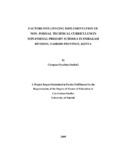| dc.description.abstract | The purpose of this study was to establish the factors influencing the
implementation of non formal technical curriculum in non formal primary schools
in Embakasi division, Nairobi province, Kenya. The division has the second
largest percentage of non formal schools in Nairobi province. Technical subjects
are the major distinguishing characteristics from the predominantly academic 8-44
educational system. Factors considered in the implementation of the non formal
technical curriculum were learning-teaching facilities, teachers’ academic and
professional qualifications, students’ characteristics, the role of quality assurance
officers and government policy on non formal education.
A cross sectional survey design was used since it ensured that all types of non
formal primary schools in Embakasi division were represented, the design was
based on stratified random sampling which focused on NEE registering bodies.
The major business were Gender and Social Services, Attorney General and the
ministry of education through stratified random sampling almost all types of non
formal schools were captured including those in slum areas. Respondents were
headteachers/managers, teacher and students.
After sampling these three categories of respondents appropriate questionnaires
were then administered. Purposive random sampling was used to get relevant
education officers for interview. From the study it was found that virtually all non formal schools had extremely
limited teaching-learning facilities and materials. Appropriate classroom,
textbooks, tools and equipment were almost wholly lacking. Moreover,
professionally qualified teachers were very sparsely distributed. Another key
finding was that most students came from economically poor backgrounds where
the token fee charged was generally unaffordable. In terms of supervision the
impact of quality assurance officers was minimal. It appeared that the main reason
was a total lack of a Government policy on non formal education.
It was apparent from the findings that teaching-learning materials are critical to
the implementation of the non formal technical curriculum. Facilities are another
essential requirement. Professionally qualified teachers are equally necessary
more so because of the technical curriculum which requires special expertise.
There is also need to financially or materially subsidize non formal schools so as
to reduce the financial burden on poor parents.
A key recommendation from the study is the urgent need to introduce a clear
government policy on non formal education. That way vital standards concerning
teaching-learning materials and facilities, teachers academic and professional
qualifications as well as staffing norms will be put in place. With an official
policy it will also be possible to have regular supervision from quality assurance officials. All these will enormously contribute to the implementation of the non
formal technical curriculum which is very relevant to the learners particularly in
terms of leading to gainful employment. The non formal education sector remains
a largely unexplored area. It is therefore important that more studies be conducted
both in urban and rural areas. Researches should be conducted on the
implementation of the academic curriculum. Another area for study is on
challenges of evaluating the curriculum for national examinations. | en_US |

